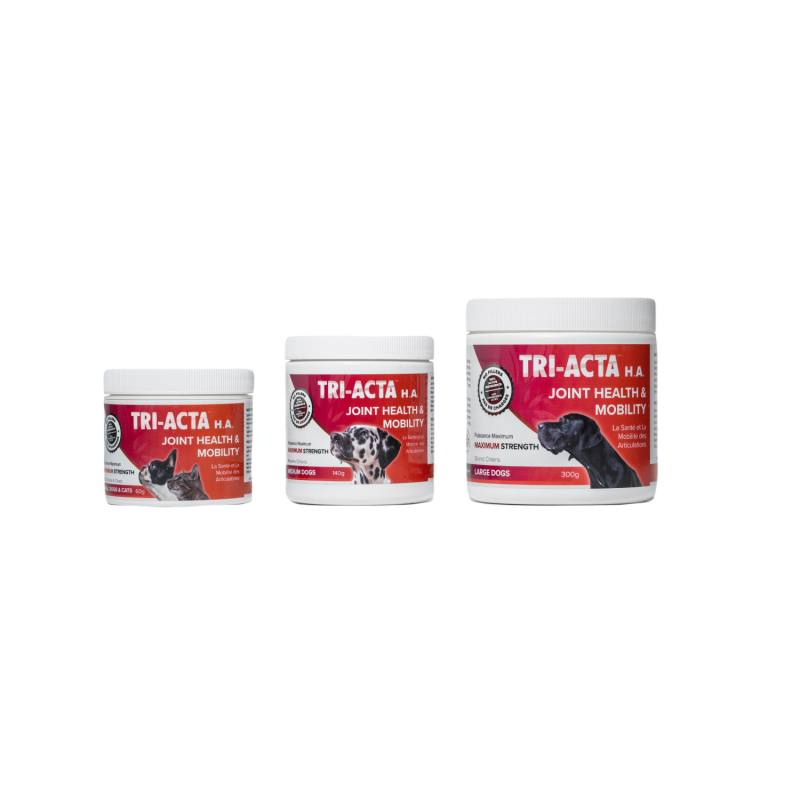Table of Contents
Type #2: NSAIDS
Inflammation is a normal part of the body's natural healing process. However, when it lasts for an extended period of time, it can cause pain and discomfort in your dog. Anti-inflammatory drugs are used as a way to reduce inflammation and relieve these symptoms.
One class of dog anti-inflammatory drugs is NSAIDs.
Non-steroidal anti-inflammatory drugs work by inhibiting the production of prostaglandins, which are chemicals that cause pain and inflammation among other actions in the body. An enzyme called cyclooxygenase (COX) is activated when a cell is damaged. Upon damage to the cells, COX stimulates the production of several substances, including prostaglandins.
Some NSAIDs work by blocking COX or by blocking some activity of certain prostaglandins, depending on the situation. The table visualization below shows the difference between these two mechanisms.
|
Type of NSAID Pathway |
How it Works |
|
Pathway 1: NSAIDs Block COX |
|
|
Pathway 2: NSAIDs Inhibit Prostaglandin |
|
As great as these medications are, they can, however, cause serious side effects because they interfere with other prostaglandin functions and can lead to problems with liver and kidney function if used for a long period of time. Yikes!
Type #3: Corticosteroids
Another commonly prescribed class of dog anti-inflammatory drugs is the corticosteroid family of medicines.
As anti-inflammatory drugs for dogs, corticosteroids can be divided into two categories:
- Mineralocorticoids: Contribute to electrolyte balance.
- Glucocorticoids: Contribute to carbohydrate, protein, and lipid metabolism, immune response, and stress response.
Joint pain, allergies, respiratory conditions, and skin issues are often treated with low doses of both types of these dog anti-inflammatory drugs. Lupus and Addison's Disease are commonly treated with higher doses.
Although these anti-inflammatory drugs can be helpful for dogs, their effects may also suppress the immune response, making infections more likely.
Dog Anti-Inflammatory Drugs Side Effects
Watching for dog anti-inflammatory drugs side effects is crucial to any pet's safety. If your veterinarian has prescribed anti-inflammatory medication for your pup's pain relief or to help them recover from surgery or injury, it's important that you monitor them closely while they're taking the medication.
Side effects of dog anti-inflammatory medications like NSAIDs can include:
- Vomiting
- Diarrhea
- Reduction in typical appetite
- Lethargic and less active than normal
- Kidney and liver problems
- Potential for stomach and intestinal ulcers and associated bleeding
If you’re like any pet pawrent, it can be hard to remember what is truly dangerous for your dog when it’s a stressful situation.
With the word BEST, you can easily remember the signs of dog anti-inflammatory drugs side effects:
- B: Behavior changes suddenly
- E: Eating less than normal
- S: Skin redness and scabs
- T: Tarry stool, diarrhea, and vomiting
Avoiding Dog Anti Inflammatory Side Effects
There are several ways to avoid dog anti inflammatory side effects that can be potentially dangerous to your pup:
- Check the label and make sure you're using the correct dosage
- Don't use anti-inflammatories for long periods of time
- Don't use anti-inflammatories if your dog has a health condition that leaves them prone to kidney and liver issues
- Never feed an OTC human painkiller
- If your dog has a health condition, like diabetes or heart disease, talk to your vet before using any type of anti-inflammatory medication. This will prevent complications from occurring as a result of taking medications that may interfere with other drugs they take for their existing conditions.
When it comes to avoiding side effects like those we have mentioned above, you can opt for pain relief options that don’t come with harmful or dangerous side effects – and deliver real healing simultaneously! Supplements like TRI-ACTA for pets can be fed over a long period of time (even their whole lives!) without worrying about adverse reactions caused by synthetic drugs.
Integricare’s TRI-ACTA for Pets and TRI-ACTA H.A. for pets offer a side-effect-free experience that can deliver an effective dose of pain and inflammation reduction, as well as the ability to treat the problem at the same time using the power of glucosamine chondroitin for dogs. Simply put, supplements can be a better, safer option for long-term pain relief than dog anti-inflammatory medicines.
Q&A
Being a good pet pawrent can sometimes leave you with more questions than you’d like. And it’s not always easy to get a straightforward answer.
Good news! We’re here to help answer your questions about dog anti-inflammatory medications, supplements, and treatments so you can focus on what matters – your pup!
How to Treat Dog Anti-Inflammatory Side Effects?
If your dog is experiencing side effects, contact your vet immediately. Call the vet if you are unsure what to do or if the side effects your pet is experiencing are normal. If you cannot contact your vet, take your dog to an emergency animal hospital as soon as possible so that he can be seen by a veterinarian and treated for his condition.
How to Administer Anti-Inflammatory Drugs to Your Dog?
Who likes taking their medication? Not your dog, that's for sure! As much as they may not love to take their liquid or capsule medication, it's important to get your dog's prescribed dose of anti-inflammatory medication into their systems.
Since we know it's no easy task, some tips for safely administering a dog anti-inflammatory include:
- Make sure the dog is in a comfortable position. Nothing is worse than trying to get them to swallow a pill or liquid dose of medication when they are not comfy!
- Make sure the dog is calm and relaxed before administering the medication.
- Give NSAIDs with a meal. This can reduce the chance of stomach upset. You can also use this as a method to disguise medication in their dinner. Make sure when you sneak it into their food to use wet or dry food with a ton of flavour and scent so it can trick even the best of sniffers into taking their medication.
- Be sure to use the correct dose of NSAID for your dog's size, weight, breed, and medical condition.
- Ask your veterinarian about any possible side effects of NSAIDs. You can also read the drug’s client information sheet. If you are not handed one when you receive your dog’s prescribed drug, ask for it. Do not administer NSAIDs with corticosteroids or other NSAIDs.
- Familiarize yourself with signs of all possible adverse reactions to NSAIDs before administering them.
- If your dog exhibits any one of these signs after taking an NSAID (such as nausea or vomiting), discontinue its use and seek veterinary care immediately.
If all else fails, you can try products like a pill gun or pill popper "cases", but use with caution as your dog can choke easily.
What are Signs of an Allergic Reactions to Anti-Inflammatory for a Dog?
If a dog is allergic to anti-inflammatory medication, the signs of an allergic reaction may include:
- Redness around the eyes and mouth
- Hives
- Rashes
- Itching/scratching of the skin, especially around their paws or face (if your dog has long hair)
- Swelling of the face, lips and tongue
If you think your pet may be having an adverse reaction to his medication, contact your veterinarian immediately.
What Are FDA-Approved Dog Anti-Inflammatory Medicine?
The FDA-approved dog anti-inflammatory medicines include:
- Carprofen
- Deracoxib
- Firocoxib
- Grapiprant
- Meloxicam
- Robenacoxib
Unfortunately, there are many dog anti-inflammatory products on the market that claim to be medications or magic cure-alls – and not all of them are completely safe. That's why it's important only to feed your dog medications prescribed by your veterinarian when your dog is in serious distress, like post-operatively or after a serious injury, and to consult your vet when using non-prescription medications like dog anti-inflammatory supplements.
You can also look for things on the packaging of your dog's supplement like "Third Party Lab Tested" and approvals from groups like Health Canada that tell you this product is safe and effective.
Are Dog Anti-Inflammatory Drugs for Humans Safe for Dogs?
It’s important to note that while humans can take medications like ibuprofen and acetaminophen, they are not safe for dogs. In fact, dogs have different physiology than us and different metabolisms, meaning they need different doses of medication and supplements than we do. They also cannot process the coatings and certain ingredients contained in these medications.
Additionally, the way their bodies process drugs is also different from ours – so taking a medication in the same dosage as another species can cause serious side effects or even death.
In addition to differences in metabolism and dosing requirements between dogs and humans, there are also drug interactions between certain medications that can be dangerous if given to pets.
Conclusion

In conclusion, we hope that this article has given you a good idea of the different medications and supplements which can be used to treat your dog’s arthritis. While there are many options available, it is important to discuss them with your vet before making any decisions about treatment or trying new products.
One family of products you, your vet, and your pup can trust to offer a safe and effective treatment for dog inflammation and pain? TRI-ACTA for Pets. With 100% active ingredients, and approval from Health Canada, you know it’s safe and effective – without a bunch of fillers that do nothing for your pup, and end up costing you more per serving. And when your pup gets a little older, or needs more from their dog anti-inflammatory, you can trust our TRI-ACTA H.A. for Pets to take care of them.
Find out more about our pet health supplements and where to buy them, plus find more great tips for keeping your pets well on our blog.










.jpg?height=2000&name=Cliick_Integricare-DISPLAY-REVISEDV2%20(1).jpg)



